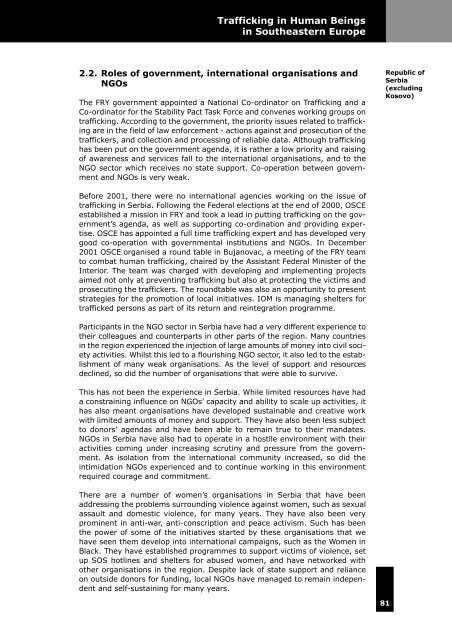Trafficking in Human Beings in Southeastern Europe - Iom
Trafficking in Human Beings in Southeastern Europe - Iom
Trafficking in Human Beings in Southeastern Europe - Iom
- No tags were found...
Create successful ePaper yourself
Turn your PDF publications into a flip-book with our unique Google optimized e-Paper software.
<strong>Traffick<strong>in</strong>g</strong> <strong>in</strong> <strong>Human</strong> Be<strong>in</strong>gs<strong>in</strong> <strong>Southeastern</strong> <strong>Europe</strong>2.2. Roles of government, <strong>in</strong>ternational organisations andNGOsThe FRY government appo<strong>in</strong>ted a National Co-ord<strong>in</strong>ator on <strong>Traffick<strong>in</strong>g</strong> and aCo-ord<strong>in</strong>ator for the Stability Pact Task Force and convenes work<strong>in</strong>g groups ontraffick<strong>in</strong>g. Accord<strong>in</strong>g to the government, the priority issues related to traffick<strong>in</strong>gare <strong>in</strong> the field of law enforcement - actions aga<strong>in</strong>st and prosecution of thetraffickers, and collection and process<strong>in</strong>g of reliable data. Although traffick<strong>in</strong>ghas been put on the government agenda, it is rather a low priority and rais<strong>in</strong>gof awareness and services fall to the <strong>in</strong>ternational organisations, and to theNGO sector which receives no state support. Co-operation between governmentand NGOs is very weak.Republic ofSerbia(exclud<strong>in</strong>gKosovo)Before 2001, there were no <strong>in</strong>ternational agencies work<strong>in</strong>g on the issue oftraffick<strong>in</strong>g <strong>in</strong> Serbia. Follow<strong>in</strong>g the Federal elections at the end of 2000, OSCEestablished a mission <strong>in</strong> FRY and took a lead <strong>in</strong> putt<strong>in</strong>g traffick<strong>in</strong>g on the government’sagenda, as well as support<strong>in</strong>g co-ord<strong>in</strong>ation and provid<strong>in</strong>g expertise.OSCE has appo<strong>in</strong>ted a full time traffick<strong>in</strong>g expert and has developed verygood co-operation with governmental <strong>in</strong>stitutions and NGOs. In December2001 OSCE organised a round table <strong>in</strong> Bujanovac, a meet<strong>in</strong>g of the FRY teamto combat human traffick<strong>in</strong>g, chaired by the Assistant Federal M<strong>in</strong>ister of theInterior. The team was charged with develop<strong>in</strong>g and implement<strong>in</strong>g projectsaimed not only at prevent<strong>in</strong>g traffick<strong>in</strong>g but also at protect<strong>in</strong>g the victims andprosecut<strong>in</strong>g the traffickers. The roundtable was also an opportunity to presentstrategies for the promotion of local <strong>in</strong>itiatives. IOM is manag<strong>in</strong>g shelters fortrafficked persons as part of its return and re<strong>in</strong>tegration programme.Participants <strong>in</strong> the NGO sector <strong>in</strong> Serbia have had a very different experience totheir colleagues and counterparts <strong>in</strong> other parts of the region. Many countries<strong>in</strong> the region experienced the <strong>in</strong>jection of large amounts of money <strong>in</strong>to civil societyactivities. Whilst this led to a flourish<strong>in</strong>g NGO sector, it also led to the establishmentof many weak organisations. As the level of support and resourcesdecl<strong>in</strong>ed, so did the number of organisations that were able to survive.This has not been the experience <strong>in</strong> Serbia. While limited resources have hada constra<strong>in</strong><strong>in</strong>g <strong>in</strong>fluence on NGOs’ capacity and ability to scale up activities, ithas also meant organisations have developed susta<strong>in</strong>able and creative workwith limited amounts of money and support. They have also been less subjectto donors’ agendas and have been able to rema<strong>in</strong> true to their mandates.NGOs <strong>in</strong> Serbia have also had to operate <strong>in</strong> a hostile environment with theiractivities com<strong>in</strong>g under <strong>in</strong>creas<strong>in</strong>g scrut<strong>in</strong>y and pressure from the government.As isolation from the <strong>in</strong>ternational community <strong>in</strong>creased, so did the<strong>in</strong>timidation NGOs experienced and to cont<strong>in</strong>ue work<strong>in</strong>g <strong>in</strong> this environmentrequired courage and commitment.There are a number of women’s organisations <strong>in</strong> Serbia that have beenaddress<strong>in</strong>g the problems surround<strong>in</strong>g violence aga<strong>in</strong>st women, such as sexualassault and domestic violence, for many years. They have also been veryprom<strong>in</strong>ent <strong>in</strong> anti-war, anti-conscription and peace activism. Such has beenthe power of some of the <strong>in</strong>itiatives started by these organisations that wehave seen them develop <strong>in</strong>to <strong>in</strong>ternational campaigns, such as the Women <strong>in</strong>Black. They have established programmes to support victims of violence, setup SOS hotl<strong>in</strong>es and shelters for abused women, and have networked withother organisations <strong>in</strong> the region. Despite lack of state support and relianceon outside donors for fund<strong>in</strong>g, local NGOs have managed to rema<strong>in</strong> <strong>in</strong>dependentand self-susta<strong>in</strong><strong>in</strong>g for many years.81
















